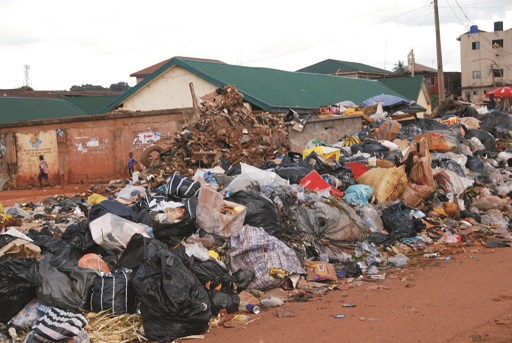
Improving Waste Management in Nigeria
Not too long ago, the most densely populated state in Nigeria, Lagos State banned the use of Styrofoam owing to the extent of waste lying and defacing the environment as well as its non-biodegradable characteristics. In another news, Abia State government in a policy intervention read a riot act to the public concerning the continued use of Styrofoam.
Presently, the state of waste management in Nigeria is of major concern due to the high rate of waste generation and ineffective management practices. In 2022, Nigeria produced an estimated 32 million tonnes of solid waste, with only about 20-30 percent of it being collected and managed correctly. The remainder of the waste is either dumped in unauthorized places or burned, contributing to pollution and health risks.

The situation is even worse in many African countries as there is a growing waste management crisis. While the volumes of waste generated in Africa are relatively small, compared to developed regions, the mismanagement of waste in Africa is already impacting human and environmental health. Available data shows that 125 million tonnes per annum of municipal solid waste (MSW) was generated in Africa in 2012, of which 81 million tonnes (65%) was from sub-Saharan Africa.
In Sub-Saharan Africa, Nigeria produces the most solid garbage, with approximately 70 percent of it being plastic waste that winds up in landfills, water bodies, or sewers. According to the World Bank, Nigeria is the tenth largest producer of unmanaged plastics in the world, accounting for 2.7 percent of the global total.
Dangers of Poor Waste Management
Waste disposal and management have a direct effect on climate change, and appropriate waste disposal and management are critical components of any climate protection policies and actions.
- Poorly handled waste emits methane, a greenhouse gas that accounts for approximately 20 percent of total greenhouse gas emissions. This is to demonstrate that poorly handled waste in Nigeria can have a negative impact on the climate.
- Poor waste management – ranging from non-existing collection systems to ineffective disposal -causes air pollution, water and soil contamination.
- Open and unsanitary landfills contribute to contamination of drinking water and can cause infection and transmit diseases. The dispersal of debris pollutes ecosystems and dangerous substances from electronic waste or industrial garbage puts a strain on the health of urban dwellers and the environment.
Challenges of having an effective waste management system
- Inadequate Infrastructure: Nigeria lacks appropriate waste management infrastructure, such as waste collection, treatment, and disposal facilities. This makes waste management and disposal challenging, especially in rural areas.
- Lack of Awareness: Nigerians are generally unaware of the advantages of a circular economy and the need to reduce waste. This makes mobilizing public support for waste reduction and recycling initiatives difficult. People’s ignorance leads them to believe that it is simpler to burn their waste than to find better ways to recycle.
- Limited Funding: Waste management funding in Nigeria is limited, making it challenging to invest in unique waste management infrastructure and technologies. There is minimal funding and support for “wastepreneurs” who choose to work in this field.
- Weak Regulatory Framework: Nigeria has a weak regulatory framework for waste management, making environmental laws and regulations difficult to implement. In contrast to Nigeria, dumping refuse in sewage gutters and on the streets is a crime. This is not to suggest that there aren’t fines for such behavior, but they’re rarely enforced.
- Lack of Collaboration: There is a lack of collaboration in waste management efforts between the government, private sector, foreign investors, and civic society. This makes implementing a comprehensive waste management plan that addresses the issues of waste generation, collection, treatment, and disposal challenging.
Moving Forward………
Poor waste management practices in particular the widespread dumping of wastes in water bodies and uncontrolled dump sites, aggravates the problems of generally low sanitation levels across the African continent. Urbanisation is on the rise in Africa and this trend is expected to continue in the future. Hence, to arrest the effects of poor waste management, there are four pronged approaches which are summarised in the infographic below.


